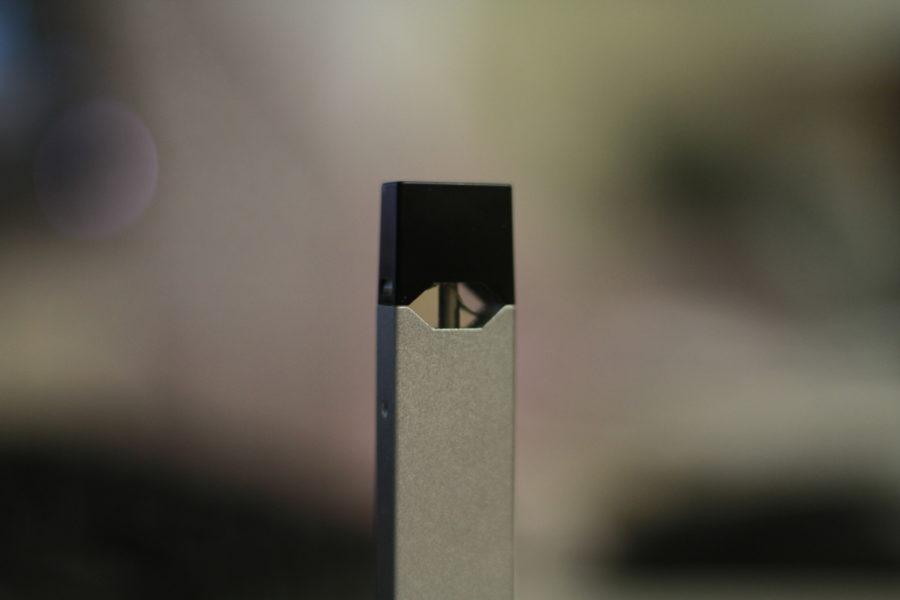By Emily Loewinger
Gulf Coast News Wire
Many students who took up the JUUL trend last year didn’t realize they would become addicted.
“The first thing I would want to do in the morning is hit the JUUL,” Florida Gulf Coast University junior Emily Simpson said.
Simpson said she smoked her JUUL “every day, all day,” for four months before reducing her consumption and getting rid of her JUUL a few months ago. Prior to smoking JUULs, Simpson had never smoked cigarettes.
While some students say they crave the nicotine, others say they are addicted to the flavors of the JUUL pods or the feeling of inhaling and exhaling smoke.
“I’m more addicted to the action of hitting [smoking] the JUUL,” FGCU senior Fallon Nelson said. “It’s like that oral fixation.”
Similarly to most typical addictions, quitting smoking JUULs is difficult for users.
“Sometimes I would hide it so I would stop using it so much,” Simpson said.
Simpson said that she still JUULs about twice a day. Since she got rid of hers, she takes hits of her friend’s or roommate’s JUULs. Her roommates are trying to reduce their consumption as well but haven’t had much luck.
“I’ve come home and they [Simpson’s roommates] will be smashing their JUUL with a hammer,” she said.
Simpson said that the process of reducing her consumption was difficult, but better for her physical and mental health.
“I quit because it made me more anxious and depressed. I lost my appetite and felt lazy,” she said. “I didn’t do anything about it for a while because I still liked the head high.”
Some students have varying experiences while JUULing—the common term developed to refer to smoking JUULs. Some people seem to benefit from JUULing, while others, like Simpson, feel lethargic and depressed.
“I JUUL because nicotine is an anxiety reliever,” FGCU freshman Sophia Arias said. “I have a history of anxiety, so this helps takes the edge off a little.”
While some people do feel less anxious when smoking nicotine, research into smoking has shown that smoking actually increases anxiety and tension, according to the Mental Health Foundation.
“Nicotine creates an immediate sense of relaxation so people smoke in the belief that it reduces stress and anxiety,” the Mental Health Foundation website said.
Some people found that JUULs benefitted them more than cigarettes.
“I don’t get out of breath as quick, my skin cleared up and I honestly feel cleaner,” FGCU junior Garrett Pierce said.
Pierce used to smoke cigarettes and transitioned to JUULs to get rid of the cigarette smell and feel healthier.
“I’m addicted to nicotine, like, 100 percent,” Pierce said. “If I don’t have my JUUL, I just crave and crave and crave cigarettes.”
Many people who JUUL—including all of the sources in this article—said they wouldn’t go anywhere without their JUUL. They bring it to work, friendly outgoings and even class. The size and odorless smoke of the JUUL make it easy to conceal.
“It’s like a safety blanket,” Pierce said. “Like, how people can’t go anywhere without their phone, I can’t go anywhere without my JUUL.”
There is still a lot of research being conducted about the long-term effects of JUULs. In 2016, the U.S. Surgeon General Jerome Adams issued an advisory that emphasized the importance of protecting youth from using electronic cigarettes, like JUULs, because they can harm brain development and encourage cigarette use.
“I think now there’s more kids addicted to nicotine than there ever was with cigarettes,” Pierce said.
Last year, the JUUL company got rid of the more popular flavors like mango, fruit medley, crème brulee and cool cucumber because the flavors seemed to attract teens to JUULs.
Some stores sell accessories for JUULs like colorful skins so people can personalize them.
According to the JUUL company, the intention of JUULs was to create a device that would transition people away from smoking cigarettes. They reduced the nicotine concentration in some JUUL pods from 5 percent to 3 percent to ween people off the nicotine.
“It’s better than an addiction to cigarettes,” Pierce said. “If it’s used for its intended purpose, it’s a good thing.”





































John R. Polito • Feb 27, 2019 at 9:34 pm
What nicotine dependent students need is honest and accurate recovery info, that nicotine addiction is REAL drug addiction, a brain wanting disorder and true mental illness that’s as real and permanent as alcoholism.
While we can fully and comfortably arrest our chemical dependence, we cannot kill or cure it. After quitting, just one puff, dip, vape or chew and it won’t be long before they find their brain wanting, plotting to obtain or even begging for more.
It’s the key to successful quitting, awareness that just one puff and up to half of our brain dopamine pathways would become occupied by nicotine. As found by the Brandon 1990 study, nearly all who “tasted” a cigarette relapsed (88%). “The high rate of return to regular smoking once a cigarette is tasted suggests that the distinction between an initial lapse and full relapse may be unnecessary.”
The Garvey 1992 study followed 235 adult smokers for one full year after attempting to quit. It found that, “Those who smoked any cigarettes at all in the post-cessation period (i.e. lapsed) had a 95% probability of resuming their regular pattern of smoking subsequently.”
It’s why all articles and videos by Joel Spitzer, America’s most studied nicotine cessation educator, end the same. Joel reminds us of the one rule that if followed provides 100 percent odds of success, to never take another puff. So, if I were an addicted student I’d add one more class: Nicotine Dependency Recovery 101. I’d live inside Joel’s Library and wouldn’t come out until both smarter and wiser than nicotine’s grip upon my mind, thinking and life: https://whyquit.com/joel/
Breathe deep, hug hard, live long,
John R. Polito
Nicotine Cessation